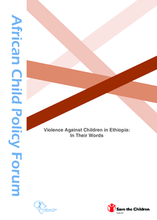Violence against children remains a pervasive, but largely ignored issue in many parts of the world, particularly in Africa. This is certainly the case in Ethiopia, where children regularly face humiliating physical punishment and psychological abuse at home, in school and in the community-at-large. Children endure painful and harmful acts against them, primarily, and ironically, committed by those closest to them - parents, family members, neighbours, schoolteachers and peers. Violence comes in all shapes and forms including rape, beatings, bullying, sexual harassment, verbal abuse, abduction, early marriage, female genital cutting, committing children to abusive and exploitative labour, trafficking, and the use of children as weapons and targets of war.
There is little understanding of how harmful this violence can be to a child’s development, growth and survival. Regrettably, too often and in too many African countries, cultural and traditional beliefs deeply rooted in society sanction violence as a way of disciplining children. There is no tradition or knowledge of alternative ways to discipline children. Worse is the fact that children remain powerless victims, their viewpoints and opinions generally ignored without formal or traditional recourse for protection.
For these reasons, the African Child Policy Forum has initiated a major programme of work on violence against children that combines research, advocacy and policy dialogue. One outcome of this programme is a major research study into the nature of violence against children in Ethiopia. The results of this study are available in three parts; these collectively give only a glimpse of the type and extent of the violence Ethiopian children face every day.
This publication comprises the third and final set of results from this study. It details the children’s actual perceptions of the violence they experience, allowing them space to explain how violence affects their everyday life and how it diminishes their basic development. This paper suggests the need to know more about the nature and incidence of violence against children, and the views and perceptions that surround it. It also suggests the urgent need to formulate and implement effective policies and programmes to combat violence against children. Using the children’s suggestions and their stories, the study recommends measures aimed at creating awareness; law reform and effective enforcement of existing laws; establishing mechanisms for effectively reporting violence; systematic data collection from children; providing support to victims of violence; and enhancing child participation in research and decision-making activities.
©The African Child Policy Forum

